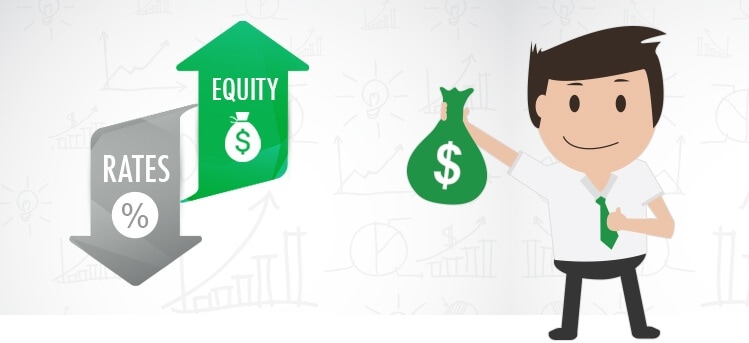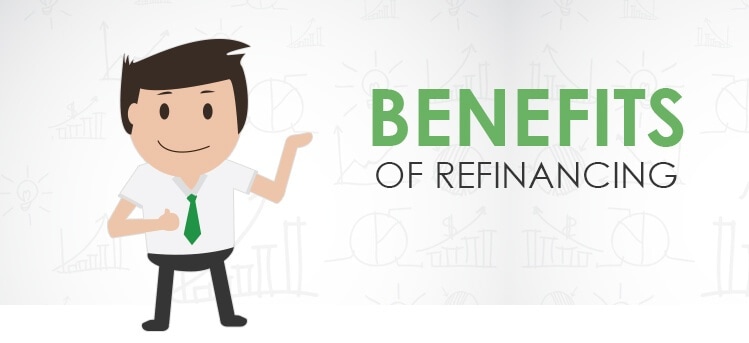When Should I Refinance My Mortgage?
When the rates are low!
Well … actually there’s a little more to it.
With the recent drop in rates, you might have given some serious thought to refinancing. But will a refinance be worth all of your time and effort?
Many homeowners choose to refinance in order to save money, but this doesn’t always end up being the case.
Whether you’d like to lower your monthly payment or pay your mortgage sooner, there are some important things you’ll want to consider so you can make the right decision for you.

What does it mean to refinance?
When you refinance your mortgage, it means that you plan to pay off your existing loan and replace it with a new one.
Homeowners refinance for many reasons. Here are some of the most common goals they hope to achieve:
- To obtain a lower interest rate
- To shorten the term of their mortgage
- To convert from an adjustable-rate mortgage (ARM) to a fixed-rate mortgage or vice-versa
- To tap into the home’s equity to finance a large purchase
Who do I contact?

If you’re wondering who the right person is to help you refinance, your best bet is a mortgage lender. With their knowledge and expertise on mortgage programs, they can match you with the right program and ensure that the decision you’re making is financially sound.
The right mortgage lender will be able to assess your financial situation, and determine if a refinance will make the most sense for you. They’ll help put an ease to your confusion and keep you well-informed throughout the process. No sweat.
How about options?
You can refinance your mortgage for a few purposes that could be beneficial to you:
- Shorten your loan term – Refinance to a shorter term loan. For example, switching from a 30-year to a 15-year.
- Convert between adjustable – rate and fixed-rate mortgages – Switch to a different program to either lock in or change rates.
- Tap into your home’s equity – Use the equity you’ve built up in your home to finance another large purchase.
If you’re underwater (not literally) …
When your mortgage balance exceeds the current value of your property, refinancing can be a difficult task. If your mortgage is “underwater”, your refinance options are limited.
However, there are a couple of options available to save the day:
HARP
You may be eligible to refinance through the Home Affordable Refinance Program (HARP). If you’re qualified, you can refinance a loan that’s 105 % to as high as 125% of a home’s value.
The catch is, you have to be on your way to foreclosure and if you’ve had any delinquent payments in the last 12 months, then you’ll be disqualified. Also, Fannie Mae or Freddie Mac has to own the loan.
If you’re in over your head, this might be a program worth looking into.
HAMP
So, maybe you’re a little worse off than you thought. In addition to an underwater mortgage, you have also missed payments.
Fortunately, you could qualify for the federal Home Affordable Modification Program (HAMP) that’s available through your mortgage lender. Once again, the mortgage needs to be owned by either Fannie Mae, Freddie Mac or other signed up with the U.S. Treasury in order for you to qualify.
Although it’s technically not a refinance program, it can still lower your mortgage payments , but your best bet is to bring it up to your trusted lender to see if it’s a good fit for you.
What are the benefits?

Should you choose to refinance your mortgage, you can reap many benefits and have a few great options when doing so.
Here are some of the potential benefits of refinancing:
Increasing cash flow
Wouldn’t you like to use that extra cash for something other than your mortgage?
When you refinance to a lower interest rate, your monthly mortgage payment will decrease, therefore saving you money that you can use for other important things like retirement savings, other debts, savings or hopefully something fun.
Switching to a different loan type
If you think you’re stuck with the mortgage program you chose from the start, think again.
With a refinance you can make the switch from an adjustable-rate (ARM) mortgage to a fixed-rate mortgage, so you can lock in the current low rates available.
Switching to a different loan type can also shorten your mortgage term, which can be great if you can’t picture your life without paying a mortgage. This way, you can pay the principal balance down, build equity in your home sooner and pay less interest over the life of the loan, saving you more money.
Getting access to the equity in your home
Are you planning to use major funds for buying a car or furthering your education?
A refinance to your mortgage can allow you to dip into the equity that you’ve built up in your home and use that for other major purchases or home improvements. If you’ve built up a lot of equity in your home, this can be a great option if you need to come up with significant funds and soon.
Avoiding foreclosure
If you’re struggling to make your mortgage payments each month, a refinance can help you to have lower payments and avoid a foreclosure that you’ve been worried about. A refinance can allow you to escape the worry of losing your home, ruining your credit and pretty much any other financial disaster that comes to mind.
Keeping your credit report clean
One of the great things about refinancing is that it doesn’t create any negative activity on your credit history. This is good if you’ve been hesitant to refinance due to worry of impacting your credit.
Are there any risks?
One of the major risks you can encounter when refinancing your home is when you pay down your current mortgage with a line of home equity credit. Many mortgage agreements require a fee to make this happen, and those fees can add up to thousands of dollars.
It you want to ensure that a refinance is worthwhile, make sure the agreement covers the penalty. However, this is only if you’re trying to dip into your home’s equity.
Other risks involve fees that you should be aware of before you refinance, like paying for an attorney to make sure you’re getting the best deal possible and bank fees.
If you’d like to avoid bank fees, take some time to shop around or wait for low rates to refinance. It’s always worth it if you can save money, right?
Should I refinance my mortgage?

Take a look at this simple plan to really make your decision:
Check your finances beforehand
Preparing to refinance is not much different than preparing for a mortgage. You’ll need to make sure your credit score and history are good so you can once again qualify for low rates.
The current value of your home will play a large role too. If you’ve built a lot of equity in your home, then you’re in good hands. Many lenders will require a maximum 80% Loan-to-Value (LTV) ratio. To get the ratio, you divide the size of your loan by the property’s appraised value.
Compare rates
As you know, many people look to refinance their mortgage in order to take advantage of low rates. If you currently have an adjustable-rate mortgage, a refinance might be strongly advised, because it’s inevitable that the rates will rise in the near future, with predictions for 2016 as high as 5.5%. Yikes.
Consider your plan
One thing you should know is how long you plan to live on your property because in order for a refinance to make sense, you should plan to live in your home for awhile.
For example, if you’re only 10 years into a 30-year mortgage and decide to refinance, you’ll have 30 more years still to pay. Sure you might save money, but will those 10 extra years of payments actually be worth it?
It’s not very likely. However, if you’re still unsure, you should contact your lender to determine the best plan of action. Your lender can help you to go over the advantages and disadvantages to see if it’s the right decision.
Calculate savings
Also, you can utilize one of the many refinance calculators online where you’ll enter the following information:
- Current loan amount
- Current interest rate
- Current term
- Origination year
- New loan amount
- New interest rate
- New term
- Refinance fees
Once you’ve entered the information, you can then see how much money a refinance could save you.
If you come to find that you won’t save any money, or that the savings will be minimal, it’s probably not worth your time and effort to refinance. However, you might find a program that will save you money and benefit you in the long run.
It’s all about weighing the pros and cons with your lender.
[ctamain]
Leave a Reply